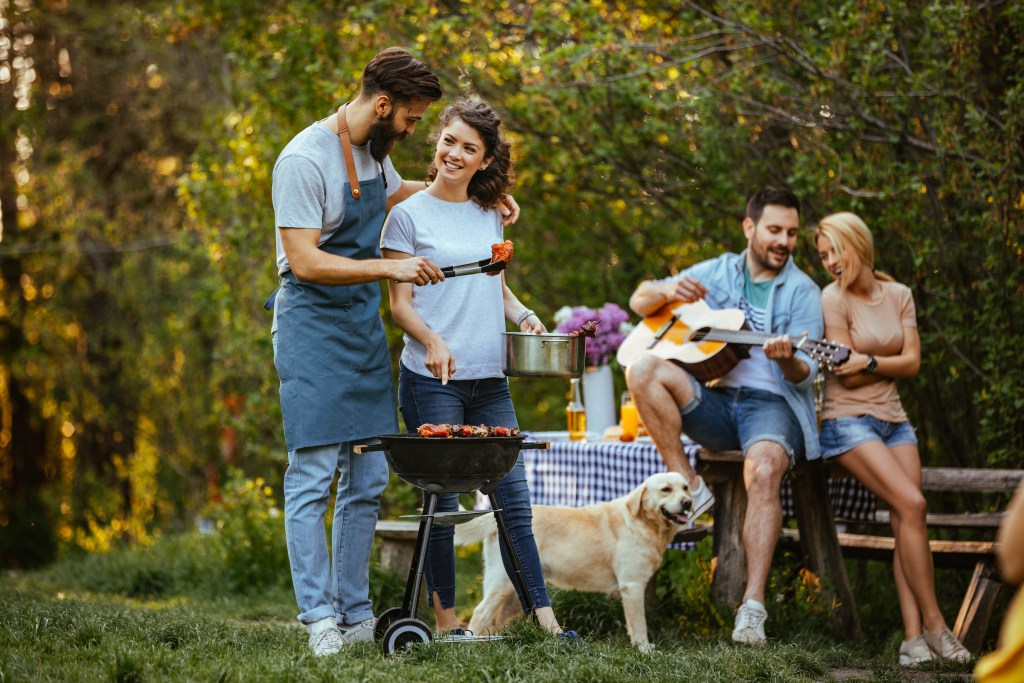What are you looking forward to most about the summer — maybe warm evenings or days at the beach with your dog? What about a barbecue? After all, that’s an activity you and your friends, human and canine, can all enjoy.
As much fun as gathering for hot dogs and hamburgers can be, catching your dog licking the grill might cause more worry than laughter. Not only is it important to keep any food preparation spots free from dirt and germs, but your pup’s health can be a concern, too. Let’s find out whether licking the grill can be harmful to your pet, and how you can nip this habit in the bud.
Why does my dog lick the grill?
If your four-legged friend likes to lick the drip pan, the rack, or any other parts of the grill, you’re not a bad pet parent. Odds are, you’re just a really great cook!
It’s definitely not unheard of for a dog to be attracted to the smells of food cooking, especially if they’re a treat-motivated pup. Some mischievous dogs may even enjoy the smell — and taste — of grease itself.
Of course, there will always be that dog who licks and chews for attention. They may see you spending lots of time at the grill instead of with them, which could be enough to prompt a closer investigation from your buddy.
No matter what piques your dog’s interest, he will need to learn to keep his tongue off the grill for his own safety. Not only can the grease, char, and other grill particles make them sick, but grills can be hot enough to seriously injure someone of any species. Even if your pup does get into the drip pan, though, you don’t need to panic.

What happens if I catch my dog licking the grill?
If you catch your buddy in the act, the first thing to do is correct the behavior as soon as you can. An effective correction will direct their attention away from the unwanted behavior in favor of another, preferred behavior.
You can use a command like “No” or “Leave it,” followed by either another command (and praise as soon as it’s followed) or by an alternative activity, like playtime away from the grill. The American Kennel Club reminds pet parents that it’s easier to teach a dog what she is supposed to do versus what she should not do. This is just one more reason to stay on top of your training!
If you know or even suspect that your dog managed to ingest some of the grease or juices from the grill, keep a watchful eye on her. A few licks should not be enough to do much damage, but even just a bit of a fatty substance like grease can cause some stomach upset.
The largest concern — aside from keeping your pup away from the heat when a grill is on — is pancreatitis, which can be fatal if left untreated. When a dog consumes a lot of fat, which is exactly what grease and oil are, the pancreas can become inflamed and damaged by its own enzymes. Normally, these enzymes become active in the intestines and help break down food, but pancreatitis causes them to activate sooner. If this happens, explains the AKC, you may notice symptoms like:
- repeated vomiting
- diarrhea
- loss of appetite
- abdominal pain or bloating
- weakness
- fever
- dehydration
You may be able to manage your pup’s health at home if they only exhibit one or two of these symptoms. For multiple symptoms, or if they get severe, please take your dog to a veterinarian as soon as you can.
We know this sounds scary, but there’s a lot you can do to prevent anything like this from happening. Refreshing your training and obedience commands is the very first thing to do, even though it may take a little time before your buddy has mastered the skills. How you use these skills is up to you, but many pet parents ask their dogs to wait in their bed or in a certain spot away from the grill while it’s in use.
With your dog happily occupied and kept safely away from your barbecue grill, you can enjoy the food, company, and sunshine to the best of your ability. Everyone will feel much more at ease with a pup who won’t get into mischief, and you won’t have to worry about anyone getting sick — especially your four-legged friend!
Editors' Recommendations
- Funny dog video: Pup has an adorable reaction to a superhero pet on TV
- This is the ultimate week-by-week puppy training schedule every new pet parent needs
- Why won’t my dog bark? Here’s when pet parents should be concerned
- Bad dog? Bad pet parent: Why your dog’s disobedience is your fault
- Why does my dog have the zoomies? Your pet’s crazy behavior, explained




